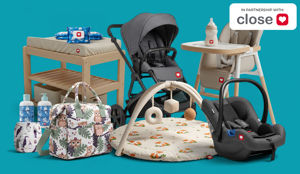Pumping can sometimes be the preference or the necessary option for parents who wish to feed their baby breastmilk but cannot, for whatever reason, feed them directly from the breast. Whether this is because the baby is tube fed, they wish to supplement breastfeeding/bottle feeding, or mom needs to go back to work/ baby starts childcare. Or the parents want/need flexibility in who feeds baby, or they choose to pump to wean onto bottles as baby gets older. Whatever the reason, pumping is a decision you can make at any time in your breastfeeding journey, so you don't necessarily need to purchase a pump from day one.
Choosing how to feed your baby can seem like an overwhelming decision, and the phrase 'breast is best' has probably been thrown at you a million times - but don't feel like breast is the only way to go. Making an informed decision is the best way to feel confident in your choice, so check out our article on whether breast really is best and read through the pros and cons of breast and bottle feeding.
Here, we've rounded up all the pros and cons of pumping so you can make an informed decision before you invest in a breast pump:
Pros of Breast Pumping
Take Advantage of Your Milk Flow
Pumping straight after breastfeeding helps fully empty your breasts, ensures your supply is maintained and can help increase it.
You can build up a 'stash' in your freezer so your baby can get the benefits of breast milk even after you've finished nursing. Breast milk can be stored for 6-12 months in the freezer!
Pumping can help to relieve the engorgement that some women experience when solely breastfeeding.
Breast pumping can also save your nipples from becoming sore from cluster feeding or teething.
An Alternative if You Can’t Nurse
Many mothers have problems with nursing, and it's nothing to be ashamed of!
Some people experience issues with poor latch, tongue-tie or low supply, so having pumped breast milk available is important to ensure your baby gets enough food.
Top tip: Freezing milk that you have pumped allows for a good milk supply that you can use anytime!
Share the Feeds
With an increased milk supply, feeding your baby can be much easier. Not only can you control the timing and amount your baby feeds, but the person feeding them doesn't have to be mom!
Pumping allows more freedom for mom to return to work or even to go out and about and still ensure baby will be fed without them.
Plus, arguably the most significant benefit, it allows you to share the feeding overnight! Why should mom just suffer from poor sleep? Take turns once the baby is in their own room at six months so you can both have a bit more rest.
Donated Milk
Plenty of people with a baby are unable to breastfeed. For some, breastfeeding is not an option, and some babies will receive breast milk from donors.
Donated milk helps to save the lives of premature and sick babies and is beneficial to those with adopted babies and no access to a lactating breast.
Donated breastmilk helps millions of babies through milk banks where you can donate milk and receive the help you may need. If you have an oversupply or milk to spare, consider donating some too!
Controlling Feed Times
It can sometimes be necessary to monitor the milk intake of your baby. Whether this is because of a medical issue or to regulate their feeds to ensure they are getting exactly the right amount, pumping helps you know exactly how much milk they are getting and gives you control over timing and frequency.
Cons of Breast Pumping
Less Immune System Benefits
When breastfeeding, particularly in the early days and during cluster feeding, the positive feedback loop between your suckling baby and breast milk allows for the necessary nutrients and quantity to adjust to ensure your growing baby is getting what it needs (supply and demand). The more the baby suckles, the more you'll produce prolactin (milk-making hormone) and oxytocin (milk-ejecting hormone).
If you have chosen to pump exclusively, you won't get the benefit of this natural loop, so the milk produced may be less tailored to your baby's specific needs - but of course, pumped milk still provides lots of nutrients! You may need to stick to a pumping schedule to ensure you get the correct quantity and adjust this if demand changes.
Expense
To breastfeed, you don't necessarily need any equipment. Simply put, you need a boob and a baby (plus a nursing bra and breast pads if required).
However, pumping is quite different, as you'll need some equipment to get going. It can be expensive, particularly if you opt for electric pumps over manual pumps. Then there are the milk storage bags you'll need to keep a stash of bottles, a sterilizer, teats, and coolers/bottle warmer to take the milk out and about with you.
So you can start pumping without spending a fortune, check out our article on what you really need.
Less Convenient, Especially While Out of the House
It's easy enough to feed your baby with a bottle or breastfeed in public, but pumping in public or at work can be challenging. If you need to stick to a pumping schedule, leaving the house as an exclusive pumper can cause worry. There are plenty of coverups you can wear in public. Some mothers opt to pump in their car, but you shouldn't run and hide in a bathroom. It's not sanitary, and you shouldn't have to hide away.
Some brands of breast pumps sit discreetly in your bra so that you can pump wherever you are. If you're back at work, your employer must provide you with a safe, clean place, such as a meeting room or quiet room with a lockable door (NOT a bathroom!) to express milk throughout the day.
Requires Storage Space
Storing milk can be a nightmare, and there are a few things to consider.
Like any fresh milk, breastmilk can go out of date. Many people opt to freeze it as soon as they've pumped. This way, the milk will take up less fridge space and last longer. To prepare it, defrost it in warm water, and it's ready for your baby to drink!
You can store breast milk in the fridge for up to five days or six to twelve months in the freezer. Check out our article on expressing and storing your breast milk if you'd like more detail on how to keep your milk from going bad.
Your Baby, Your Choice
As with breastfeeding, getting a correct latch that suits both you and baby to maximize comfort and output and pumping is a learned skill. Finding the right size flange, cycle and vacuum strength, frequency, and timing can take some time until you get it perfect.
Not all babies take quickly to bottles too, so pumping isn't always an option for parents. Whatever your decision on how to feed your baby, know there's a whole community of pumping, combined feeding, and breastfeeding moms out there to offer advice should you need it too.






